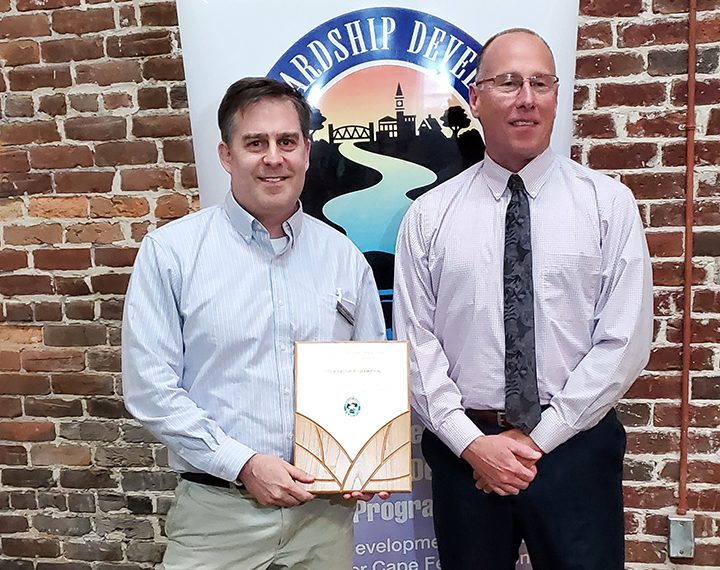The developers behind a handful of southeastern North Carolina projects were recently recognized for environmental stewardship in their approaches to design and construction.
The Lower Cape Fear Stewardship Development Coalition, a regional organization that works to protect, conserve and raise awareness of natural resources, presented the awards during a luncheon Feb. 20 at the Coastline Conference and Event Center. The awards recognize residential, commercial and public development projects in Brunswick, Pender and New Hanover counties that demonstrate outstanding environmental stewardship.
Supporter Spotlight
“We are excited to showcase this year’s winners. Our goal remains to create inspiration for future stewardship projects in the Lower Cape Fear region by demonstrating the unique and outstanding work by our award winners,” said Dylan McDonnell, New Hanover County’s long-range planner and chair of the Lower Cape Fear Stewardship Development Award Program. “We believe that green building and eco-friendly site planning can be incorporated into almost every development project to some degree.”

Stewardship Champion Award
The coalition’s Stewardship Champion Award recognizes exceptional individuals or organizations that exemplify extraordinary vision, innovation, leadership and action for the environment in the Cape Fear region. This award went to Cape Fear Community College’s Sustainability Technologies Program, which prepares students for employment in environmental, construction, alternative energy, manufacturing, or related industries, with emphasis on energy production, waste reduction and sustainable technologies.
“The disciplines emphasized by this program make projects like those highlighted by the Lower Cape Fear Stewardship Coalition possible by providing the construction professionals of tomorrow with a clear understanding of the practical requirements for achieving sustainable development goals,” according to the coalition.
State Employees Credit Union
State Employees Credit Union received “Outstanding Recognition” for its use of a underground infiltration system for stormwater and related features in a redevelopment project at its Randall Parkway branch in Wilmington.
Expanding the branch location to an adjacent lot where there was a house formerly used as a business, the credit union built a new branch building and a system that collects stormwater from the parking and drive aisles. Runoff flows into a system sized to twice the state requirement and able to infiltrate, or slowly soak into the soil.
Supporter Spotlight
The new building uses roof runoff to irrigate the landscaping without gutters or downspouts. A french drain around the perimeter of the building collects water from below the plantings that is not taken up by the plants, and then routes the water to the infiltration system. During big rainstorms when the landscaped area is saturated, water overflows across the remainder of the building perimeter’s landscaping and sod, which act as filters, before going into the infiltration system for treatment.
Pervious pavers were also used to provide immediate infiltration, decreasing the treatment system’s load. Existing trees were retained and incorporated into buffers.
“The new stormwater treatment now protects the downstream environment, which it didn’t before, while new sidewalks and driveways provide more connectivity to surrounding properties,” the coalition said.
Middle Sound Village
Middle Sound Village, a residential project using low-impact development standards, also received the Outstanding Recognition award. The 45 lots for homes of between about 2,200 and 3,200 square feet on around 10 acres amounts to about four and half units per acre in an area zoned for mixed-use and high-density residential.
The project in the unincorporated area of New Hanover County includes urban features without the negative effects of urban sprawl, according to the coalition. Energy efficient construction techniques and materials and water-saving faucets and shower heads are combined with landscaping choices that include drought-tolerant plants and grasses without an irrigation system.
Stormwater measures include minimal street widths and limited site grading with swales that follow contours to direct drainage to infiltration basins. Alleyways are pervious pavement, walking trails are mulch and wood decking was used in lieu of concrete patios. Rain gardens and bioswales were also used throughout the development and two rain barrels made from recycled materials were included at the rear of each home.
UNCW Recreation Fields
The University of North Carolina Wilmington’s Campus Recreation received the Significant Achievement award for incorporating sustainable practices into renovations and construction. Measures included steps to protect live oaks and other trees surrounding the recreation field and infiltration systems for stormwater management help protect the delicate Bradley Creek watershed. The field was graded so that runoff does not flow into streets and storm drains.
Per university requirements, waste was minimized during the project by reusing, salvaging and recycling as much as feasible.
LED field lights were used to reduce the energy consumption and increase visibility.
The coalition said that perhaps the most sustainable aspect of the project was also the most innovative. Instead of commonly used plastic pellets, artificial turf fields were padded with all-natural coconut husks to reduce the carbon footprint of the project, with an important added benefit of being a safer option for those using the field.







